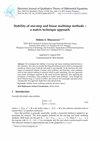皮卡德-林德尔定理的最优版本
IF 0.8
4区 数学
Q1 MATHEMATICS
Electronic Journal of Qualitative Theory of Differential Equations
Pub Date : 2021-10-03
DOI:10.14232/ejqtde.2021.1.3
引用次数: 1
摘要
考虑微分方程y = F (x, y)。我们确定了|上F (x, y)−F (x, z)|的最弱可能上界,保证了该方程对于所有初值都有一个全局唯一解。设F: R→R为连续函数。众所周知的全局Picard-Lindelöf定理表明,如果F对第二个变量是Lipschitz连续的,那么对于每一个实数y0,初值问题y ' = F (x, y), y(0) = y0有一个唯一解,该解存在于全局。另一方面,初值问题y ' = 2√|y|, y(0) = 0有无穷多个解,可参数化为实数−∞≤a≤b≤∞本文章由计算机程序翻译,如有差异,请以英文原文为准。
Optimal version of the Picard-Lindel\"of theorem
Consider the differential equation y = F (x, y). We determine the weakest possible upper bound on |F (x, y)−F (x, z)| which guarantees that this equation has for all initial values a unique solution, which exists globally. Let F : R → R be a continuous function. The well known global Picard-Lindelöf theorem states that if F is Lipschitz continuous with respect to the second variable, then for every real number y0, the initial value problem y ′ = F (x, y), y(0) = y0 has a unique solution, which exists globally. On the other hand the initial value problem y′ = 2 √ |y|, y(0) = 0 has infinitely many solutions, which can be parametrized by real numbers −∞ ≤ a ≤ b ≤ ∞ as
求助全文
通过发布文献求助,成功后即可免费获取论文全文。
去求助
来源期刊
CiteScore
1.40
自引率
9.10%
发文量
23
审稿时长
3 months
期刊介绍:
The Electronic Journal of Qualitative Theory of Differential Equations (EJQTDE) is a completely open access journal dedicated to bringing you high quality papers on the qualitative theory of differential equations. Papers appearing in EJQTDE are available in PDF format that can be previewed, or downloaded to your computer. The EJQTDE is covered by the Mathematical Reviews, Zentralblatt and Scopus. It is also selected for coverage in Thomson Reuters products and custom information services, which means that its content is indexed in Science Citation Index, Current Contents and Journal Citation Reports. Our journal has an impact factor of 1.827, and the International Standard Serial Number HU ISSN 1417-3875.
All topics related to the qualitative theory (stability, periodicity, boundedness, etc.) of differential equations (ODE''s, PDE''s, integral equations, functional differential equations, etc.) and their applications will be considered for publication. Research articles are refereed under the same standards as those used by any journal covered by the Mathematical Reviews or the Zentralblatt (blind peer review). Long papers and proceedings of conferences are accepted as monographs at the discretion of the editors.

 求助内容:
求助内容: 应助结果提醒方式:
应助结果提醒方式:


